
-
 German govt sees economy shrinking again in 2024
German govt sees economy shrinking again in 2024
-
Ex-UK soldier denies passing secrets to Iran intelligence

-
 Creator's death no bar to new 'Dragon Ball' products
Creator's death no bar to new 'Dragon Ball' products
-
Three Kosovo Serbs on trial over 'secession plot' attack

-
 Van Gogh museum to launch Impressionism show
Van Gogh museum to launch Impressionism show
-
French minister ups ante in Eiffel Tower Olympic rings row

-
 German police shut pro-Palestinian camp over Thunberg invite
German police shut pro-Palestinian camp over Thunberg invite
-
Trio wins chemistry Nobel for protein design, prediction
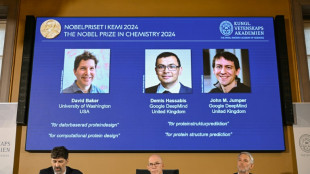
-
 SE Asian summit urges end to Myanmar violence but struggles for solutions
SE Asian summit urges end to Myanmar violence but struggles for solutions
-
Wimbledon replaces line judges with electronic system

-
 Record-breaking Root hits hundred as England's power to 351-3
Record-breaking Root hits hundred as England's power to 351-3
-
Sabalenka relishes 'much-needed' tennis rivalry with Swiatek

-
 Liverpool goalkeeper Alisson set for six weeks out
Liverpool goalkeeper Alisson set for six weeks out
-
Taylor Swift got police escort to London gigs after Austria terror plot

-
 Cook tips Root to break Tendulkar's all-time runs record
Cook tips Root to break Tendulkar's all-time runs record
-
British skull auction sparks Indian demand for return

-
 Joe Root: England's elegant Test record-breaker
Joe Root: England's elegant Test record-breaker
-
Braving war: Lebanon's 'badass' airline defies odds

-
 Klopp to return as head of Red Bull football operations
Klopp to return as head of Red Bull football operations
-
Hezbollah strikes Israel, says it foiled Israeli incursions

-
 Jurgen Klopp to return as head of Red Bull football operations
Jurgen Klopp to return as head of Red Bull football operations
-
US weighs Google breakup in landmark trial

-
 Record-breaking Root guides England to 232-2 in reply to Pakistan's 556
Record-breaking Root guides England to 232-2 in reply to Pakistan's 556
-
Japan PM dissolves parliament for 'honeymoon' snap election

-
 Goodbye Tito? Tomb at risk as Serbs argue over Yugoslav legacy
Goodbye Tito? Tomb at risk as Serbs argue over Yugoslav legacy
-
Restoration experts piece together silent Sherlock Holmes mystery

-
 Sinner avoids Shanghai deja vu with assured Shelton win
Sinner avoids Shanghai deja vu with assured Shelton win
-
Pyongyang to 'permanently' shut border with South Korea

-
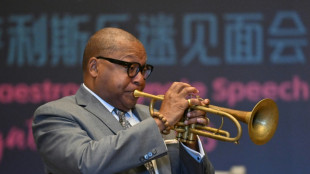 Trumpet star Marsalis says jazz creates 'balance' in divided world
Trumpet star Marsalis says jazz creates 'balance' in divided world
-
No children left on Greece's famed but emptying island

-
 Nepali becomes youngest to climb world's 8,000m peaks
Nepali becomes youngest to climb world's 8,000m peaks
-
Climate change made deadly Hurricane Helene more intense: study

-
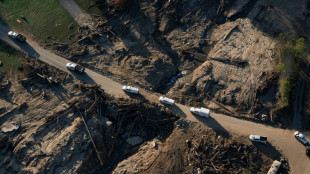 A US climate scientist sees hurricane Helene's devastation firsthand
A US climate scientist sees hurricane Helene's devastation firsthand
-
Padres edge Dodgers, Mets on the brink

-
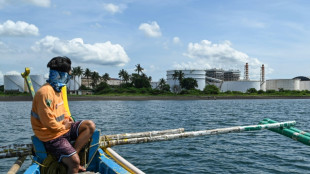 Can carbon credits help close coal plants?
Can carbon credits help close coal plants?
-
With EU funding, Tunisian farmer revives parched village
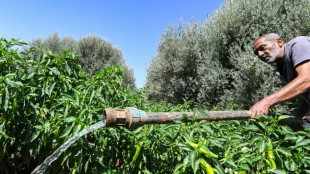
-
 Sega ninja game 'Shinobi' gets movie treatment
Sega ninja game 'Shinobi' gets movie treatment
-
7-Eleven owner's shares spike on report of new buyout offer

-
 Your 'local everything': what 7-Eleven buyout battle means for Japan
Your 'local everything': what 7-Eleven buyout battle means for Japan
-
Three million UK children living below poverty line: study

-
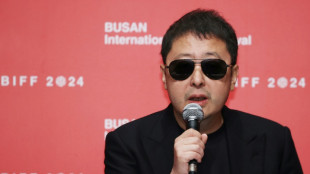 China's Jia brings film spanning love, change over decades to Busan
China's Jia brings film spanning love, change over decades to Busan
-
Paying out disaster relief before climate catastrophe strikes

-
 Chinese shares drop on stimulus upset, Asia tracks Wall St higher
Chinese shares drop on stimulus upset, Asia tracks Wall St higher
-
SE Asian summit seeks progress on Myanmar civil war

-
 How climate funds helped Peru's women beekeepers stay afloat
How climate funds helped Peru's women beekeepers stay afloat
-
Nobel Peace Prize to be awarded as wars rage

-
 Pacific island nations swamped by global drug trade
Pacific island nations swamped by global drug trade
-
AI-aided research, new materials eyed for Nobel Chemistry Prize

-
 Mozambique elects new president in tense vote
Mozambique elects new president in tense vote
-
The US economy is solid: Why are voters gloomy?


SE Asian summit urges end to Myanmar violence but struggles for solutions
Southeast Asian leaders pressed Myanmar's junta and its opponents on Wednesday to take "concrete action" to stop the bloodshed in the country's civil war and sought to kickstart faltering diplomatic efforts to solve the crisis.
The 10-member Association of Southeast Asian Nations (ASEAN) has tried to no avail to find a negotiated solution to the Myanmar crisis, which has killed thousands of people and forced millions to flee their homes since the military seized power in February 2021.
The crisis dominated the first day of the ASEAN summit in Vientiane, where the disputed South China Sea will also be high on the agenda.
ASEAN leaders held their first face-to-face talks with a senior Myanmar junta representative in more than three years on the first day.
The junta has suffered serious battlefield defeats over the past year during a renewed offensive by ethnic minority armed groups and pro-democracy "People's Defence Forces" that rose up to oppose its coup.
ASEAN leaders condemned attacks on civilians and "urged all parties involved to take concrete action to immediately halt indiscriminate violence", according to a draft summit chairman's statement seen by AFP.
The junta agreed to a "five point consensus" plan with ASEAN to restore peace weeks after it ousted Aung San Suu Kyi's government, but instead pushed ahead with a bloody crackdown on opposition to its rule.
After condemning Myanmar for ignoring the five-point plan at summits in 2022 and 2023, the leaders insisted again on Wednesday it was still their "main reference" to deal with the crisis, the chairman's draft statement said.
How to enforce it remains unclear.
"We are trying to find ways to move forward, because we have to admit that although the five points have been there... we have not been very successful in actually changing the situation," Philippine President Ferdinand Marcos told reporters.
"We are trying to formulate new strategies," he said, adding that those new strategies had not yet been decided.
Thai foreign ministry spokesman Nikorndej Balankura confirmed there was no discussion at the summit on how to implement the peace plan.
Myanmar sent a senior foreign ministry official to the meeting after three years of shunning summits because the bloc barred junta chief Min Aung Hlaing in the wake of the coup.
- Bloc's clout in doubt -
ASEAN's failure to make any tangible progress in resolving a civil war inside one of its own members has fuelled longstanding questions about its effectiveness.
"The longer the Myanmar crisis remains unresolved, the greater the risk of ASEAN outliving its usefulness in resolving conflicts within the Southeast Asian region," Mustafa Izzuddin, international affairs analyst at Solaris Strategies Singapore, told AFP.
With formal diplomacy making no progress, Thailand will host informal talks on the crisis in December involving ASEAN members and possibly neighbouring countries such as China and India.
US Secretary of State Antony Blinken will join the leaders in Vientiane for talks on Friday, when he is expected to press for the junta to take steps such as reducing violence, releasing political prisoners and engaging with the opposition.
Daniel Kritenbrink, the top US diplomat for East Asia, said there had been "virtually zero progress" on these issues from the junta.
Premier Li Qiang of China -- long Myanmar's most important ally -- will hold talks with ASEAN leaders on Thursday before joining an "ASEAN Plus Three" summit with new Japanese Prime Minister Shigeru Ishiba and President Yoon Suk Yeol of South Korea.
The South China Sea will also be discussed when the leaders sit down with Li, after months of violent clashes between Chinese vessels and Philippine and Vietnamese fishermen.
Beijing claims almost all of the South China Sea, a waterway of immense strategic importance through which trillions of dollars in trade transits every year.
Four ASEAN members -- the Philippines, Vietnam, Indonesia and Brunei -- have competing claims to various small islands and reefs.
The draft summit statement reiterated ASEAN's longstanding calls for restraint and respect for international law.
T.Vitorino--PC
